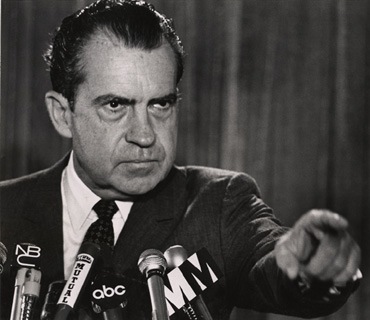|
 "The
people who have the cards are usually the ones who talk the least and the softest; those who are bluffing tend to talk loudly and give themselves away."
-- Richard Nixon "The
people who have the cards are usually the ones who talk the least and the softest; those who are bluffing tend to talk loudly and give themselves away."
-- Richard Nixon
Bluffing should be like eating vegetables -- it's good for you even if somewhat unpleasant. Don't think of bluffing as candy,
something fun, because having too much bluffing fun will make you sick to your bankroll/stomach. (See also
Cunning, Fraud and Flight)
Bluffing is the sexiest of the poker betting actions. Except when it's plainly stupid, it is bold, daring and exciting. Aside from the
adrenaline rush of winning something significant, bluffing gets the juices flowing much more than other actions, especially things
like folding or calling or betting the best hand. Bluffing feeds the same human desires as riding a rollercoaster or seeing a scary
movie. People like semi-living on the edge. Needless edge-play though not only becomes foolhardy, it takes the edge off the edge.
If you don't ever get caught bluffing you almost certainly don't bluff enough. There is a theoretically ideal point where you would
bluff only and always when you would get away from it, but that perfection is not possible in the real world. Getting caught bluffing
once in awhile actually pays off in terms of getting called when you do have the goods.
But bluffing too often leads to pointless bankroll swings, and leads to the psychological inevitability of losing begetting losing. A
person who plays two hands and wins one and loses the other will almost always be on a lower psychological plane than a person who
played neither hand. Let's face it, to a human being, winning X dollars is never as pleasant as losing X dollars is unpleasant. A
$20/40 player who loses $1000 one day is basically always more pissed off than he is pleased when he wins $1000 in a day. It's a
common obsession among players to "get even" when they are losing four or five bets. Players might risk their entire fortune
to try and get those five bets. In contrast, when a player is five bets winner, winning another five bets has virtually zero effect on
anyone. It's spooky how humans can look at two things of equal value in completely different ways.
Bluffing is
risking loss, and people suck at losing, so the psychological effects of bluffing should be put into your mental calculator when
deciding whether to bluff or not.
Still, all this translates into: don't do too much of a good thing. And bluffing surely is a good thing. Bluffing is the act of
earning with personal boldness some economic value that you were unable to earn with the objective assets of your cards.
"Revenue streams" is a catch phrase of our times. Having revenue come in via diversified means is a positive thing. It mitigates
against problems should one of your revenue streams get temporarily or permanently blocked. Winning poker is all about revenue streams,
a few big ones and many, many small ones. Bluffing is a good because it is, or should be, one of your diversified revenue streams. You
should make money by successfully bluffing and by people calling you because they think (or pathetically hope) you are bluffing.
But again, bluffing is the vegetable of revenue streams. The "bet the winning hand and get called" stream is a lot less stressful.
Bluffing unnecessarily, or recklessly, or foolishly, is turning a good thing into a bad one. Eating your spinach or cauliflower is
better for you than having a candy bar. Look at bluffing as something you must do, not as something you enjoy doing or particularly
want to do. If each time you play you go into your session thinking "I gotta eat my share of vegetables today", you should come
out a happier and healthier poker player.
More on Poker Bluffs |

